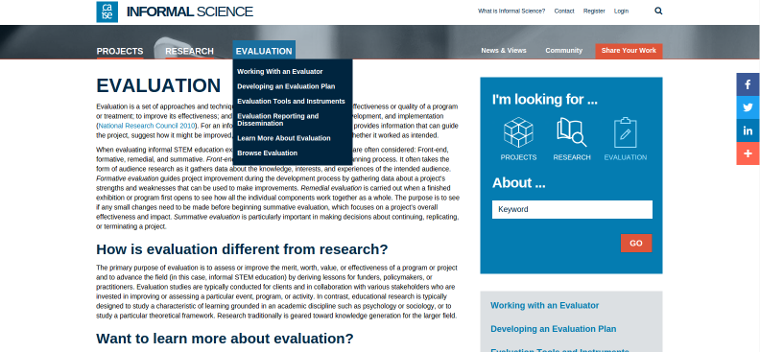How to Use InformalScience.org for Evaluation
Hi, I’m Amy Grack Nelson. I am an independent evaluation consultant and Evaluation & Research Manager at the Science Museum of Minnesota. I’m excited to talk to you about the new and improved evaluation pages on InformalScience.org. Rick Bonney, Director of Public Engagement in Science at Cornell Lab of Ornithology, and I worked with the CAISE team to reimagine the evaluation section of the website. We’ve kept much of what was on the old site, but have added much more. We hope you enjoy it!
So what can you find in these new pages? I’ll walk you through each of the different sections, then you can check them out for yourself! Remember, the evaluation section of InformalScience.org isn’t just for evaluators. The resources are also meant for the wide range of people who are involved with and use evaluation.

What is Evaluation?
On the landing page, you’ll find a short overview of the various types of evaluation in informal education evaluation, how evaluation differs from research, and a brief description of the many types of evaluation resources you can find in InformalScience.org including chapters from CAISE’s Principal Investigator’s Guide: Managing Evaluation in Informal STEM Education Projects.
An effective evaluation requires a successful partnership between the evaluator and project team. We’ve found resources to help guide the success of this partnership. Are you looking for an evaluator to form a partnership with? We’re here to help! We’ve also gathered a collection of sites where you can locate a wide variety of evaluators.
There are many things to consider when you plan an evaluation. We’ve found a wide range of resources to help you through this process. You’ll find handbooks, guides, and checklists about developing an evaluation plan; blog posts to assist you with the IRB process; and resources related to cultural competence and conducting culturally responsive evaluations.
Evaluation Tools and Instruments
Evaluation requires the use of data collection tools. Sometimes evaluators create their own, other times they use, or adapt instruments others have created. This section details what you should consider when using an off-the-shelf instrument. You’ll also find a collection of tools and instruments relevant to informal education evaluation projects that you can use right away or modify for your needs.
Evaluation Reporting and Dissemination
What should be included in an evaluation report, how should the report be formatted, and what are options for dissemination? Find a wealth of resources to answer these questions here! We also have a special section focused on the use of data visualizations to help evaluators reframe how they think about and visualize data.
Want to learn more about current and future practices in the field of informal education evaluation? You've come to the right place! Access a list of professional associations and evaluation-related journals where you can learn more about evaluation in the field of informal education as well as the evaluation field at large. Discover what kind of research on evaluation is happening in the informal science education field and what researchers have learned from these studies to advance evaluation understanding and practice. Read about field-wide summits and convenings that have occurred in the past few years to chart a path for the advancement of evaluation within the informal science education field.
Browse Evaluation Reports in InformalScience.org
Don’t forget to search the evaluation reports posted on InformalScience.org. I just did a search for “evaluation reports” and it displayed 823 results. Amazing! We are extremely lucky to have such a rich resource in our field. If you haven’t already, consider adding your own evaluation reports to the site. Let’s see if we can reach 1,000 evaluation reports on InformalScience.org by the end of 2016!
Did We Miss Anything?
We’ve gathered a wide range of resources, but we don’t know about all the great stuff happening in the world of informal education evaluation and evaluation in general. If we’ve missed something important that you would like CAISE to consider adding to the site, please comment below.